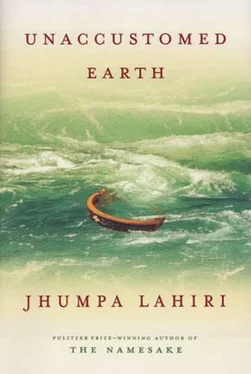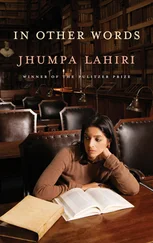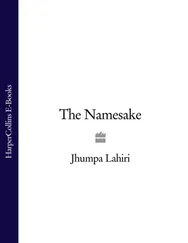In November, wandering through the National Gallery, she met a man. She had been admiring The Arnolfini Marriage by van Eyck, lingering in front of it after a cluster of people had passed. It was an oil painting of a couple in a bedroom holding hands, with a small dog standing at their feet. The man wore a fur-trimmed purple cape and an overly large black straw hat. The woman wore an emerald-green gown that trailed like a heavy curtain onto the floor, some of the material gathered up in her left hand. She had a white veil on her head and looked possibly pregnant, Sudha wasn't sure. There was a window behind the man, with a piece of fruit, an apricot or a tangerine, on the sill. On the wall hung a convex mirror that reflected everything in the painting.
"Come closer," the man next to Sudha said, ushering her a few steps forward so that no one could cross their line of vision. "Otherwise you can't really see." He started talking about the mirror, how it was the focal point of the painting, capturing the floor and the ceiling, the room and the world outside, and then she saw that it reflected not only the couple but also a pair of men standing in the doorway, peering into the room just as she was. "One of them is van Eyck," the man said. "That's what the inscription above the mirror says. It's Latin for 'van Eyck was here.' " He spoke softly, as if for Sudha alone, with the singsong British cadence that was already influencing Sudha's speech. His dark hair was slightly long, and he kept raking it with his fingers away from his face. She could smell the slightly spiced soap on his skin. He wore a tweed blazer and corduroy pants, and carried a raincoat draped over one arm. He told her that the two men in the doorway of the painting were witnessing the couple's union, adding that the painting was intended to serve as a marriage certificate. "Of course, that's just one interpretation," the man said. "Some argue that it's a betrothal scene."
She studied the details he spoke of, the glow of the paint, conscious of their shared gaze. "What about the shoes? Do they mean something?" Sudha heard herself asking, pointing to a pair of abandoned wooden clogs in the foreground, and then to some red slippers by the carpet.
The man turned to Sudha then. He was older than she expected, closer to forty judging from the eyes, clear blue eyes that settled calmly upon different points of her face. His expression was serious, placidly cast, but the sides of his mouth now rose up in a smile. "I suspect it means they're standing on holy ground. Either that or she just went shopping."
She had not known that day what a famous painting it was, but the man never made her feel ignorant. They walked to other paintings, the man bending his head down toward Sudha's and talking about them, and eventually he asked if she would like to join him for tea. His name was Roger Feather-stone. He had a PhD in art history, was an editor at an art magazine and had also written a book about Renaissance portraiture. He wooed Sudha consistently, romantically: flowers every time he knocked on the door, gifts of gloves and earrings and perfume. He was an only child who had grown up in English boarding schools; his father had worked overseas for Singer sewing machines and now both his parents were dead. Roger was born in India, spent the first three years of his life in
Bombay but remembered nothing. He had been married in his twenties to a girl he'd known at Cambridge; after two years she left him, renounced her possessions, and joined a Buddhist monastery in Tibet.
He took responsibility for things, booking theater tickets, making reservations at restaurants, packing picnics and dragging Sudha off to Hampstead Heath. He was the first man she'd dated who was never late, never forgot to call when he said he would, and Sudha quickly recognized in him the same strain of competence she possessed. He enjoyed food and cooking, inspired to get up early and walk to a favorite bakery for pastries, surprising Sudha, the first morning she woke up in his flat in Shepherd's Bush, with breakfast on a tray. He had lived alone for many years but quickly opened his life to her, giving her a key, lined drawers in his bureau, a glass shelf in his medicine cabinet. In his youth he had dreamed of being a painter, had enrolled at Chelsea Art School, but after a teacher told him he would not go far he never touched a canvas again. He was not bitter about this turn of events; like Sudha, he was a person who understood what his limits were. At the same time he could be exacting, writing withering reviews for his magazine, insisting on the best table at restaurants, sending back wine. Like Sudha he was moderate with alcohol, always ordering a bottle for the table but seldom consuming more than a glass or two.
As Christmas approached she told her parents she had too much work and did not come home, when in fact she and Roger went away together, to Seville and then to the Costa del Sol. When she returned from Spain there was a message at the switchboard of her dormitory from her parents, asking her to call. When she did, from one of the pay phones in the lobby of the dorm, they told her that Rahul's grades had not improved, that a letter had come from an adviser, expressing concern. He was in Wayland now for Christmas break; after one explosive fight, he'd stopped speaking to them. She was glad that Roger wasn't there to overhear the call, that he'd kissed her good-bye in the taxi and gone back to his flat. She'd painted a hazy image of her family that he absorbed as if it were an endnote in a book, something stemming from her but safely tucked out of sight. "I can't wait to meet them," he told her, words that, Sudha hoped, made his intentions clear. Beyond the basic details he did not probe. And so she did not tell Roger about Rahul's drinking, about his arrest, about the fact that she had not talked to her brother in months.
Her parents asked her to speak to Rahul, saying he'd gone out for a walk, to try in a little while. She waited a few days. She was surprised after all these months by how upset she felt. And she was upset at her parents, too, for still depending on her to help. She called from Roger's flat, putting the charges on a card while Roger was at work. Rahul had turned twenty in the first week of January, a thing she'd let pass without acknowledgment. He picked up the phone, and she wished him happy birthday now. It was noon in Massachusetts, early evening in London. The sky was dark through Roger's kitchen window; at the counter, Sudha was setting out cheese and crackers and olives for her and Roger to eat together when he got home.
"Things okay?" she asked.
"Everything's fine. Ma and Baba are getting totally hysterical over nothing." Rahul spoke as if no strain existed between them, asking her how London was.
"They said you failed two classes."
"They were lousy classes."
"Are you even going to your classes?"
"Lay off, Didi," he said, his mood turning.
"Are you?" she persisted.
There was a pause. She heard the flicking of a lighter, the first pent-up exhale of a cigarette. "I don't want to be doing this."
"What do you want to do?" she asked, not bothering to conceal her exasperation. "I'm writing a play."
She was surprised by this information and found it promising that he was actually doing something. He had always been a good writer; once, when he was in high school, he'd written a response to one of the take-home essay questions she had on a philosophy exam at Penn, a question about Plato's Euthyphro that her professor had approved of with a lengthy comment.
She put an olive in her mouth, extracted the thin purple pit, and placed it on a painted dish she and Roger had bought together in Seville. "That's great, Rahul. But you have to study, too."
"I want to drop out."
"Ma and Baba aren't going to go for that. Finish college and then you can do whatever you want."
Читать дальше












